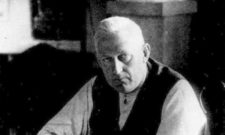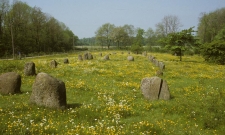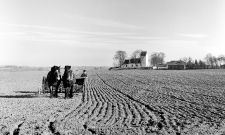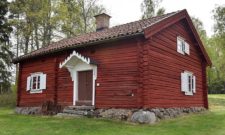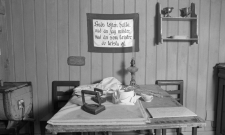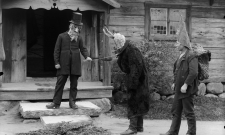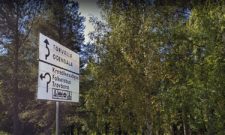Shop our historical maps

Apr
Ethnologist Johan Nordlander (1853-1934) retells tales of gnomes and other supernatural creatures in Norrland, the second part of the series Mythical legends from Norrland.
The plot is the good spirit of the house. He not only cares for the horses, but is also ready to work at any time for the good of the house. But as he is not so wise as to feed his favourite horses more abundantly than the farmer's hay supply will allow, so he has no account of taxing his neighbours' barns and fields rather heavily at times.
Some retribution he may wish, though not generally great. Usually he is satisfied with a little food; but if he does not get his necessary sustenance, he may go into the barn and feed the master's cows. Though small and insignificant, the plot bears heavy burdens enough. A farmer once agreed with an idler that he would carry freshly cut grain from his neighbour's field to the farmer's lodge. The farmer did as agreed, and always found food in a box, which was set out in a certain place, on his arrival at the lodge. All went well, and the farmer's granary was directed for each night. But now it happened that the farmer had a servant. He was thoughtless and unwise, as youth always is, and thought it would be fun to play a trick on Santa Claus. He took away the food that was set out for him. When Santa came to the lodge with his burden, and found not the usual food, he sighed and sowed:
I have worn twelve skyl and eight baun (bands) and no food found.
Of the legend, which I recorded after Mark, there are several variations. According to one, the farmer's neighbours had noticed that everything was not in order, and had therefore taken away the food set out for the plot and filled the vessel with impurities. When the farmer returned, he complained that he had "walked seven miles and dragged seven hoils" and yet was rewarded so badly. - The Santas are also called smo-karra, the little men, cf. the Bavarian name Hojemännlein. One man was busy building a cottage for himself. He did all the work himself, without any help from men, but he had laid such large corner stones and carved such rough logs that it was hard to understand how he could have done it all by himself. But he had probably not been alone, he had had the help of a small group. Even lucky hunters are said to have had tricks with these.
Our Santa Claus is the Kobold of Germany. In their characteristics they are surprisingly similar. Der Kobold is highly serviceable1, but therefore also wants to have his proper salary, "which consists mostly of milk or porridge with butter". Jonsson2 also mentions, that "porridge and milk" is a favorite dish, which is offered to Santa's feast juices. According to Wolf, it has been seen, how die Kobolde eagle followed the servants and maids, who milked, into the house and carefully licked up the spilled milk drops. This explains the following note made by me in Fors: in the past it was said that one should not regret what one spills, "because someone will have it too". On the Frisian islands the kobolds lick up what is played, when the housewives brew beer. For their sake they also leave the breadcrumbs that fall off the table. Dermed verbindet ohne zweiffel ein gammal Regel i Ångermanland att "ej sopavet golfvet, sedan man ätit gröten örn qvällen", ty då swear man bort de hullet af korna eller, selon en annan uppgift, af removnar man alla välsignelse. The basis for this is apparently the notion that the deprived landowner turns to the barn, where he feeds the cows, or leaves the house and does not care for it, as the old prosperity also disappears with him.
Der Kobold has a strong tendency to tease people and play all kinds of tricks on them, especially when he himself is teased. Samma kind har ook tomten. An old man was horribly so blunt and cranky, and worst he was before and during Christmas holidays. Nothing was then to his liking, though all sought to please him. One day before Christmas it was unusually calm and quiet, whereupon the wife said to her maid: "If only Christmas were over, and we had it this quiet and good again! They all agreed to do their best not to provoke the old man's anger. It was now Christmas Eve, and all but the servants had done their chores. The old man, who was unusually good-natured and calm, had taken out his hymn-book and sat singing Christmas hymns. But then he remembered that he had to go to the stable and give the horses hay. In the stable doorway he met three red-hooded men who came out of the hay bale and went into the carriage. He heard them laughing and laughing and laughing and laughing. The first said that they would do something; the second that he would put spices under the grist-pot in the fireplace, so that it would smell burnt; the third would make it so, that when the old man took out the brandy-bottle to give the boys a drink, it would break. When the old man heard what the gnomes intended to do, he thought to himself that they would not succeed in making him bad, he would be careful. But when he came in and smelt the smell of burning, he forgot himself, and said in an angry tone, "Don't touch the pot! He stopped himself now, but when he took out the bottle to give the boys a drink, she fell into the gulf and went to pieces. Now the lion grumbled, but then said in a gentle voice to his wife: dear mother, let someone sweep up the pieces of glass! All in the cottage wondered at the old man's gentleness that day, but he then related what he had seen and heard, and vowed that the old men would not have power with him long, for with the New Year he would become a new man. Till then they troubled him exceedingly, but after New Year's Day he was free from them. - The story, which we recorded in Ångermanland, seems to be somewhat obscure.
As a being completely separated from the plot is now considered bis the bear or bear in Ångermanland, puken in Germany. The bear and the plot, however, seem to us to be in fact one and the same; they are also both included in the German Kobold, which is also called Puck, Puken, in North Frisian according to Grimm Huspuken. But according to Wolf, the Kobold appears in many different guises, namely as a cat, dog, rooster, goat, frog and bumblebee. In central and southern Sweden the bear is represented by the milk-hares, which have the form of hares, but in northern Sweden the bear is described as having the appearance of a hive, cf. T. V. V. p. 130.
During the searches concerning witchcraft in Norrland, the bear, or porter, as he is sometimes called, plays an important role. A wife in Säbrå confessed to having had three bears, "which during the harvest provided her". She described one as "as big as a grey cat, but curly as a nut, with a mouth like a waterfall". The name hare also appears in Ångermanland. An old woman, who was engaged in preparing a bear, asked him what he would draw, saying: hare, bear, what shall you draw? - Even here. he can assume grodans creature.
Two peasant women in Multrå (Ångermanland), who died some years ago, were constantly quarrelling with each other about their cows, accusing each other of milking each other's cows through bear. Finally, one morning, when one of the old women found a frog in her cottage, she was fully convinced of the criminality of the neighbour's wife. At the aforementioned hex trials, many confessed that they had "cursed heaven and earth and everything in them, except skatan and humblan, that flies". Wife Elisabet in Ytterlännäs had used the following reading:
The Virgin Mary walked on a green leaf,
ther met her Blessed Son so sweetly.
Huadh leethe I wälsignade mor? -
I'm leetar migh a miöö-humbla
for miölkstuli and moostuli. In Nampn Fadhers, Sons and then Holy Spirits. Amen.
Even in other spells, the bumblebee appears in talk about milk ratios. I suppose, therefore, that the bumblebee is another figure for the plot, for the berries could hardly get over watercourses, whereas this was an easy thing for the bumblebee, "which flies". - In Ångermanland they have adj. bara-sugen, in Germany suck, suckling, diad of the berries, as is said of cows, when they have no hair, and sometimes no skin at the groin and inside of the thighs. The hairless patches were said to arise from the fact that the bear or puck had placed its forelegs in that place. Thus also here an expression of him in the form of a quadrupedal animal. The task of the bear and the plot is the same, namely to pull to the farm. But out of the hare, cat, bumblebee, or hive, a special creature has been formed in the popular imagination, whose connection with its upbringing has been so far forgotten that the women have believed themselves capable of making such creatures, though not without offending the evil one.
When blessing and prosperity prevail somewhere, it is said: there whores or reigns "niss Puck", says Wolf p. 836, with which one compares the statement in T. V. V. p. 132 about a backstugu woman, who had quite a good supply of what she needed and therefore, when one could not otherwise explain this, was said to have the berries. When the prosperity of a house ceases without the reason for it being understood, it is said: bis pulling, that is, he departs from this house to his owner.
The identity of the bear or milk-hen with the German Kobold is further shown by a circumstance too striking to be overlooked. In T. V. V. I said, p. 131, that the berries may be sold three times, but the third owner can never be white to him. About the kobold Wolf says p. 335 "er wird auch gekauft lind kann dreimal verkauft werden, der dritte Eigenthiimer aber muss ilin behalten" (young. "He can be sold three times but the third owner must keep him").
Sources
- Wolf, Contributions to German Mythology, second abdi. Göttingen 1857, p 336.
- Folktro, seder och bruk i Möre, Sv. landsm. 2: 5.
Subscribe to YouTube:
If you appreciate Allmogens independent work to portray our fine Swedish history and Nordic culture, you are welcome to buy something nice in the shop or support us with a voluntary donation. Thank you in advance!
Support Allmogens via Swish: 123 258 97 29
Support Allmogens by becoming a member
Support Allmogens in your will
